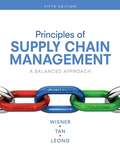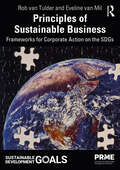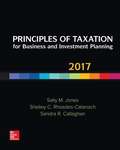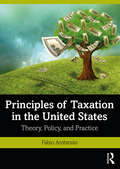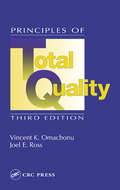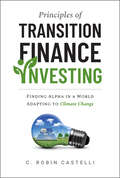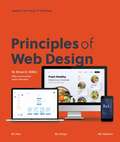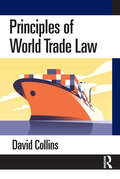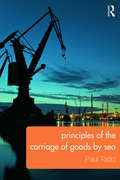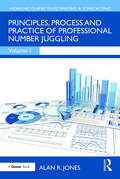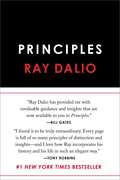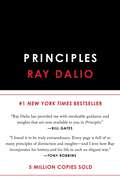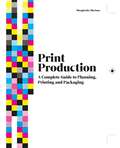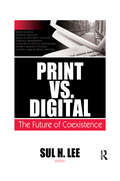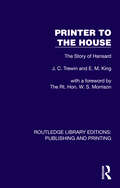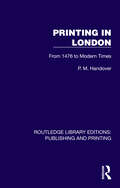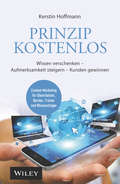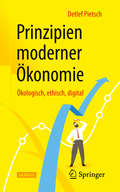- Table View
- List View
Principles of Supply Chain Management: A Balanced Approach
by Keah-Choon Tan G. Keong Leong Joel WisnerThis book helps you examine the latest practices, trends, and emerging developments and guides you step-by-step through the management of all supply chain activity. You review issues related to both domestic and global supply chains as comprehensive, one-of-a-kind coverage encompasses important processes in operations, purchasing, logistics, as well as process integration. A balanced approach follows the natural flow through the supply chain. Well-organized chapters demonstrate the practical applications of supply chain management in today's workplace with the help of intriguing SCM Profiles and interesting real business examples. Relevant end-of-chapter questions, problems, and new cases help you put what you learn into practice as you sharpen your management skills.
Principles of Sustainable Business: Frameworks for Corporate Action on the SDGs (The Principles for Responsible Management Education Series)
by Rob van Tulder Eveline van MilThe basic function of companies is to add value to society. Profits are a means to an end, not an end in itself. The ability of companies to innovate, scale and invest provides them with a powerful base for positive change. But companies are also criticized for not contributing sufficiently to society’s grand challenges. An increasingly VUCA (Volatile, Uncertain, Complex and Ambiguous) world creates serious governance gaps that not only require new ways of regulation, but also new ways of doing business. Can companies effectively contribute to sustainable development and confront society’s systemic challenges? Arguably the most important frame to drive this ambition was introduced and unanimously adopted in 2015: the Sustainable Development Goals (SDGs). The SDG-agenda not only defines a holistic set of global goals and targets, but also foundational principles to guide meaningful action to their achievement by 2030. Multinational companies have signed up to the SDGs as the world’s long-term business plan. Realizing the SDGs provides a yearly $12 trillion investment and growth opportunity, while creating hundreds of millions of jobs in the process. But progress is too slow – witnessing society’s inability to deal with pressing human, ecological, economic and health crises – whilst the vast potential for societal value creation remains underutilized. This book provides a timely account of the systemic, strategic and operational challenges that need to be addressed to enhance the effectiveness of corporate involvement in society, by using the SDGs as the leading principles-based framework for actionable, powerful and transformative change. Principles of Sustainable Business is written for graduate and postgraduate (executive) students, policymakers and business professionals who want to understand the complex challenges of global sustainability. It shows how companies can design and implement SDG-relevant strategies at three levels: the macro level, to assess whether the SDGs present wicked problems or opportunities; the micro level, to develop and operationalize innovative business models, design new business cases and navigate organizational transition trajectories; and the meso level, to develop fit-for-purpose cross-sector partnering strategies. Principles of Sustainable Business presents innovative tools embedded in a coherent sequence of analytical frameworks that can be applied in courses for students, be put into practice by business professionals and used by action researchers to help companies contribute to the Decade of Action.
Principles of Sustainable Business: Frameworks for Corporate Action on the SDGs (The Principles for Responsible Management Education Series)
by Rob van Tulder Eveline van MilThe basic function of companies is to add value to society. Profits are a means to an end, not an end in itself. The ability of companies to innovate, scale and invest provides them with a powerful base for positive change. But companies are also criticized for not contributing sufficiently to society’s grand challenges. An increasingly VUCA (Volatile, Uncertain, Complex and Ambiguous) world creates serious governance gaps that not only require new ways of regulation, but also new ways of doing business. Can companies effectively contribute to sustainable development and confront society’s systemic challenges?Arguably the most important frame to drive this ambition was introduced and unanimously adopted in 2015: the Sustainable Development Goals (SDGs). The SDG-agenda not only defines a holistic set of global goals and targets, but also foundational principles to guide meaningful action to their achievement by 2030. Multinational companies have signed up to the SDGs as the world’s long-term business plan. Realizing the SDGs provides a yearly $12 trillion investment and growth opportunity, while creating hundreds of millions of jobs in the process. But progress is too slow – witnessing society’s inability to deal with pressing human, ecological, economic and health crises – whilst the vast potential for societal value creation remains underutilized. This book provides a timely account of the systemic, strategic and operational challenges that need to be addressed to enhance the effectiveness of corporate involvement in society, by using the SDGs as the leading principles-based framework for actionable, powerful and transformative change.Principles of Sustainable Business is written for graduate and postgraduate (executive) students, policymakers and business professionals who want to understand the complex challenges of global sustainability. It shows how companies can design and implement SDG-relevant strategies at three levels: the macro level, to assess whether the SDGs present wicked problems or opportunities; the micro level, to develop and operationalize innovative business models, design new business cases and navigate organizational transition trajectories; and the meso level, to develop fit-for-purpose cross-sector partnering strategies. Principles of Sustainable Business presents innovative tools embedded in a coherent sequence of analytical frameworks that can be applied in courses for students, be put into practice by business professionals and used by action researchers to help companies contribute to the Decade of Action.
Principles of Sustainable Energy Systems (Mechanical and Aerospace Engineering Series)
by Frank Kreith Charles F. Kutscher Jana B. MilfordPrinciples of Sustainable Energy Systems provides students with a fundamental and practical understanding of the energy transition. It discusses the design, production, and economics of energy conversion and storage technologies, as well as requirements and technologies for the end-use sectors of transportation, buildings, and industry.This book begins by introducing students to the important field of sustainability and then presents comprehensive coverage of solar, wind, hydropower, biomass and bio-fuels, geothermal, nuclear, and ocean-based energy technologies. This new edition features recent advances in batteries and other storage technologies, electricity transmission, electric vehicles, and beneficial electrification and demand response in buildings, as well as approaches for reducing emissions from shipping and aviation. It introduces new material on low-carbon building materials, heat pumps, and the practical design aspects of solar photovoltaic systems. This book also covers economics and energy systems analysis methods such as life cycle assessment and greenhouse gas accounting, including detailed examples of design and financial analysis using the System Advisor Model (SAM).This book is intended for upper-level undergraduate and graduate engineering students taking courses in Renewable Energy, Energy Systems, and Energy Conversion.Instructors will have access to a Solutions Manual and Figure Slides for their course.
Principles of Taxation for Business and Investment Planning
by Sally M. Jones Shelley C. Rhoades-CatanachPrinciples of Taxation for Business and Investment Planning focuses on the role taxes play in business and investment decisions, presenting the general roles of taxation and discussing its implications for all tax-paying entities before delving into a specific exception. The benefit of this approach is a strong grasp of the fundamental principles informing taxation rules: students comprehend the framework of the tax system, making future changes to the tax code easier to understand-no matter how many there are.
Principles of Taxation for Business and Investment Planning (2017 Edition)
by Shelley Rhoades-Catanach Sally M. JonesPrinciples of Taxation for Business and Investment Planning focuses on the role taxes play in business and investment decision, presenting the general roles of taxation and discussing its implications for all tax-paying entities before delving into a specific exception. The benefit of this approach is a strong grasp of the fundamental principles informing taxation rules. This helps students comprehend the framework of the tax system, making future changes to the tax code easier to understand-no matter how many there are. Unlike traditional introductory texts, Principles of Taxation for Business and Investment Planning downplays the technical detail that makes the study of taxation such a nightmare for business students. This text attempts to convince students that an understanding of taxation is not only relevant but critical to their success in the business world. Don't just teach your students the tax code; teach them how the tax code affects business decision making with the 2017 edition!
Principles of Taxation in the United States: Theory, Policy, and Practice
by Fabio AmbrosioTaxation is a discipline that does not receive sufficient academic attention. It is typically viewed as a subset of law, accounting, public policy, economics, or finance. In this respect, most academic efforts in the field of taxation are shadowed by a mother discipline. There is currently an unprecedented need to approach tax pedagogy in a way that is independent of another discipline. This book caters to that real and unmet need in tax pedagogy. One of the book’s advantages is that it is not tied to a specific tax year and does not coddle the reader with volumes of time-sensitive information. In this book the tax year is never the focus, as the center stage is reserved for teaching the principles and skills necessary to independently find answers. The reader will learn to appreciate the complexity of the American tax system and will be endowed with the contextual understanding necessary to formulate educated opinions about how taxes work and, most importantly, why. Contrary to common belief, taxation in the United States has remained fairly stable for the last 100 years. This book uses the federal individual income tax as a vehicle to unveil the mechanics that make up the American tax system. This book is essential reading for students taking a first course in taxation, at the undergraduate or graduate level, as part of programs in accounting, law, public administration, or business at large.
Principles of Total Quality
by Joel E. Ross Vincent K. OmachonuIn this era of global competition, the demands of customers are growing, and the quest for quality has never been more urgent. Quality has evolved from a concept into a strategy for long-term viability. The third edition of Principles of Total Quality explains this strategy for both the service and manufacturing sectors.This edition addr
Principles of Transition Finance Investing: Finding Alpha in a World Adapting to Climate Change
by C. Robin CastelliLeverage science-based models for the identification of profitable investment theses Principles of Transition Finance Investing: Finding Alpha in a World Adapting to Climate Change shows how to leverage science-based models used by the largest banks in the world for their climate scenario analysis exercises and turn them into useful tools for the identification of profitable investment theses for venture capital, private equity, and private credit. This book includes deep-dive examples applied to transition finance opportunities in selected areas such as geothermal energy, farmland in northern latitudes, and energy efficiency reconversion for buildings. The book provides readers with: An understanding of what transition finance is and how it is the foundation of the next industrial revolution that humanity is facing in the second and third quarters of the 21st century The types of funds and strategies that the quantitative methodology identifies, explaining their characteristics and timeframes Steps to build and run an end-to-end framework of climate models for investment purposes Principles of Transition Finance Investing: Systematic Portfolio Building in The Era of Climate Change is an essential guide for professional investors and financial practitioners to invest in a manner that will generate profit while achieving results that are good for the environment and societies.
Principles of Value-Based Competition: Redefining Health Care
by Michael E. Porter Elizabeth Olmsted TeisbergThe zero-sum competition of the 1990s and early 2000s in the U.S. health care system has clearly failed. It did not produce widespread improvements in the quality and cost of delivering care, nor widen access to care for all Americans. Instead, zero-sum competition perpetuated inefficiency and substandard quality. Health care competition must be transformed to a value-based competition on results. This is the best way, and the only way, to drive sustained improvements in quality and efficiency. The experience in numerous other industries tells us that this transformation is possible. But what would value-based competition in health care look like?
Principles of Web Design: Understanding The Principles Of Successful Web Site Design
by Brian D. MillerLearn everything there is to know, from project planning through marketing and analytics, about Web design!Principles of Web Design is a book about the fundamentals of clear graphic communication within the context of Web design. Author Brian D. Miller is a sought-after expert in developing product and digital branding strategies for emerging startups and Fortune 500 organizations. In Principles of Web Design, he will teach the reader the tricks of the trade and everything one should know about web design through easy, step-by-step guides and with full-color illustrations. The book has three sections, which follow the cycle of a typical Web project: PLAN: This section focuses on the predesign phase of a Web project. Everything from project planning and brief writing to information architecture and responsive grid creation will be covered.DESIGN: The second section of Priciples of Web Design explores the enduring principles of design and the nuances that are specific to the field of Web design. OPTIMIZE: Finally, we close the loop and discover ways to enable your client to maximize the investment they&’ve made in their Web site with marketing and analytics.
Principles of World Trade Law
by David CollinsPrinciples of World Trade Law presents a comprehensive and balanced picture of the legal framework underpinning the modern world trading system – covering the law of the WTO but also drawing on bilateral and regional instruments. It acknowledges the shifting relevance of the WTO in world trade law in favour of regionalism, particularly in relation to new fields such as digital trade.While drawing heavily on the law of the WTO as a source of legal rules, this concise text also engages with elements found in preferential Free Trade Agreements (FTAs) (such as Rules of Origin) and mutual recognition agreements (such as recognition of professional qualifications in the case of services). Practical in nature, it blends straightforward descriptive explanations of the legal concepts with critical inquiry, directing readers to the key debates in the field as well as the source materials themselves. It also offers guidance with discussion questions for the reader to consider for each chapter.Principles of World Trade Law is an ideal introductory textbook for advanced undergraduate and postgraduate students taking courses in world trade law, international trade law, and international economic law as well as a valuable guide for scholars, legal practitioners and policymakers.
Principles of World-Class Execution: Winning in China
by Jonathan Woetzel Jimmy HexterFor multinational companies in China, the rapid evolution of markets and competition overwhelmingly demands an exacting focus on world-class execution. This chapter highlights the principles that should guide the efforts MNCs make as they ratchet up their ability to execute in China.
Principles of the Carriage of Goods by Sea
by Paul ToddPrinciples of the Carriage of Goods by Sea offers students studying this topic as part of their LLM or LLB course an accessible, comprehensive overview of the subject from a leading expert in the field. Written specifically with students in mind, concentrating on principles, and tailored to common law coverage, this title presents all the essential topics and is supported by the following useful pedagogy: Line Diagrams: illustrating the relationships between parties so that this may be understood at a glance; also where appropriate, time lines Case Studies: looking at topical matters such as piracy, and problematic areas of law such as reachable on arrival clauses and the carriage of bulk oil by sea Sample Problem Questions: problem questions and suggestions to help students to prepare for assessment Annotated appendices: concise appendix of the most important legislation and international conventions, with useful annotation from the author that explains these and puts them in context
Principles, Process and Practice of Professional Number Juggling (Working Guides to Estimating & Forecasting)
by Alan JonesPrinciples, Process and Practice of Professional Number Juggling (Volume 1 of the Working Guides to Estimating & Forecasting series) sets the scene of TRACEability and good estimate practice that is followed in the other volumes in this series of five working guides. It clarifies the difference between an Estimating Process, Procedure, Approach, Method and Technique. It expands on these definitions of Approach (Top-down, Bottom-up and‘Ethereal’) and Method (Analogy, Parametric and ‘Trusted Source’) and discusses how these form the basis of all other means of establishing an estimate.This volume also underlines the importance of ‘data normalisation’ in any estimating procedure, and demonstrates that the Estimating by Analogy Method, in essence, is a simple extension of Data Normalisation. The author looks at simple measures of assessing the maturity or health of an estimate, and offers a means of assessing a spreadsheet for any inherent risks or errors that may be introduced by failing to follow good practice in spreadsheet design and build.This book provides a taster of the more numerical techniques covered in the remainder of the series by considering how an estimator can potentially exploit Benford’s Law (traditionally used in Fraud Detection) to identify systematic bias from third party contributors. It will be a valuable resource for estimators, engineers, accountants, project risk specialists as well as students of cost engineering.
Principles: Life And Work
by Ray Dalio#1 New York Times Bestseller “Significant...The book is both instructive and surprisingly moving.” —The New York Times Ray Dalio, one of the world’s most successful investors and entrepreneurs, shares the unconventional principles that he’s developed, refined, and used over the past forty years to create unique results in both life and business—and which any person or organization can adopt to help achieve their goals.In 1975, Ray Dalio founded an investment firm, Bridgewater Associates, out of his two-bedroom apartment in New York City. Forty years later, Bridgewater has made more money for its clients than any other hedge fund in history and grown into the fifth most important private company in the United States, according to Fortune magazine. Dalio himself has been named to Time magazine’s list of the 100 most influential people in the world. Along the way, Dalio discovered a set of unique principles that have led to Bridgewater’s exceptionally effective culture, which he describes as “an idea meritocracy that strives to achieve meaningful work and meaningful relationships through radical transparency.” It is these principles, and not anything special about Dalio—who grew up an ordinary kid in a middle-class Long Island neighborhood—that he believes are the reason behind his success. In Principles, Dalio shares what he’s learned over the course of his remarkable career. He argues that life, management, economics, and investing can all be systemized into rules and understood like machines. The book’s hundreds of practical lessons, which are built around his cornerstones of “radical truth” and “radical transparency,” include Dalio laying out the most effective ways for individuals and organizations to make decisions, approach challenges, and build strong teams. He also describes the innovative tools the firm uses to bring an idea meritocracy to life, such as creating “baseball cards” for all employees that distill their strengths and weaknesses, and employing computerized decision-making systems to make believability-weighted decisions. While the book brims with novel ideas for organizations and institutions, Principles also offers a clear, straightforward approach to decision-making that Dalio believes anyone can apply, no matter what they’re seeking to achieve. Here, from a man who has been called both “the Steve Jobs of investing” and “the philosopher king of the financial universe” (CIO magazine), is a rare opportunity to gain proven advice unlike anything you’ll find in the conventional business press.
Principles: Life and Work (Principles)
by Ray Dalio#1 NEW YORK TIMES BESTSELLER * 5 MILLION COPIES SOLD&“Significant...The book is both instructive and surprisingly moving.&” —The New York TimesRay Dalio, one of the world&’s most successful investors and entrepreneurs, shares the unconventional principles that he&’s developed, refined, and used over the past forty years to create unique results in both life and business—and which any person or organization can adopt to help achieve their goals.In 1975, Ray Dalio founded an investment firm, Bridgewater Associates, out of his two-bedroom apartment in New York City. Forty years later, Bridgewater has made more money for its clients than any other hedge fund in history and grown into the fifth most important private company in the United States, according to Fortune magazine. Dalio himself has been named to Time magazine&’s list of the 100 most influential people in the world. Along the way, Dalio discovered a set of unique principles that have led to Bridgewater&’s exceptionally effective culture, which he describes as &“an idea meritocracy that strives to achieve meaningful work and meaningful relationships through radical transparency.&” It is these principles, and not anything special about Dalio—who grew up an ordinary kid in a middle-class Long Island neighborhood—that he believes are the reason behind his success. In Principles, Dalio shares what he&’s learned over the course of his remarkable career. He argues that life, management, economics, and investing can all be systemized into rules and understood like machines. The book&’s hundreds of practical lessons, which are built around his cornerstones of &“radical truth&” and &“radical transparency,&” include Dalio laying out the most effective ways for individuals and organizations to make decisions, approach challenges, and build strong teams. He also describes the innovative tools the firm uses to bring an idea meritocracy to life, such as creating &“baseball cards&” for all employees that distill their strengths and weaknesses, and employing computerized decision-making systems to make believability-weighted decisions. While the book brims with novel ideas for organizations and institutions, Principles also offers a clear, straightforward approach to decision-making that Dalio believes anyone can apply, no matter what they&’re seeking to achieve. Here, from a man who has been called both &“the Steve Jobs of investing&” and &“the philosopher king of the financial universe&” (CIO magazine), is a rare opportunity to gain proven advice unlike anything you&’ll find in the conventional business press.
Print Production: A Complete Guide to Planning, Printing and Packaging
by Margherita MarianoThe result of 35 years of experience in the publishing and printing industry, this bible provides all the information needed by anyone who wants to print and produce any type of document whether a book, a magazine, a poster or a brochure.Graphic designers, editors, production controllers, and those working in communications and marketing will find all they need to know and understand in this must-have book that clearly and authoritatively presents the theoretical facts and the technical information, but also deals with the human know-how. Richly illustrated and produced to a very high spec, this key companion covers the whole process of production step-by-step, from initial concept to the achievement of a printed object. It provides many practical tips, alerts on the traps to avoid and answers those tricky questions that you may be afraid to ask.
Print Production: A Complete Guide to Planning, Printing and Packaging
by Margherita MarianoThe result of 35 years of experience in the publishing and printing industry, this bible provides all the information needed by anyone who wants to print and produce any type of document whether a book, a magazine, a poster or a brochure.Graphic designers, editors, production controllers, and those working in communications and marketing will find all they need to know and understand in this must-have book that clearly and authoritatively presents the theoretical facts and the technical information, but also deals with the human know-how. Richly illustrated and produced to a very high spec, this key companion covers the whole process of production step-by-step, from initial concept to the achievement of a printed object. It provides many practical tips, alerts on the traps to avoid and answers those tricky questions that you may be afraid to ask.
Print vs. Digital: The Future of Coexistence (Monographs From The Journal Of Library Administration Ser.)
by Sul H. LeeLibraries are currently confronted by the challenges of managing increasing amounts of electronic information. Print vs. Digital: The Future of Coexistence presents the expert perspectives of eight of America’s leading library administrators on ways to effectively manage digital flow and offers strategies to provide a level of coexistence between digital and print information. This excellent overview explores how to best balance print and electronic resources, and explores important issues such as the selection of electronic resources, improving access to digital information for a larger user base, and effective management of a library’s fiscal and personnel resources. Print vs. Digital: The Future of Coexistence discusses the various challenges libraries now face from the massive influx of digital resources, including the ways that information-seeking behaviors have changed, the search for synergies between print and digital, economics of news preservation, and whether or not the end of print journals is at hand. New ideas and technological advances are explored, including the diverse ways these improvements will impact the future. This well-referenced resource includes useful tables, figures, and photographs. Topics in Print vs. Digital: The Future of Coexistence include: cooperative collection development balance of print and electronic resources evolvement of digital resources in libraries change in research libraries factors influencing the selection of electronic resources disseminating information about scholarly collections impact of digital resources on research behavior and techniques design of digital libraries JSTOR effects of digital information on reference collections transition of print journals to digital formats Print vs. Digital: The Future of Coexistence is a thought provoking, insightful resource on the future of libraries, invaluable for acquisitions, reference, and collection development librarians; and senior and mid-level administrators such as deans, directors, and department heads for public, special, and academic libraries.
Printer to the House: The Story of Hansard (Routledge Library Editions: Publishing and Printing)
by J. C. Trewin E. M. KingEveryone knows the name of Hansard, the famous record of Parliamentary proceedings. Very few people know how it began. Originally published in 1952, here was for the first time, the authoritative history of the Hansard family and of its work, for nearly 100 years, as Parliamentary printers in charge of the Journals of the House of Commons and of the full record of debates that still bears the family name. Full of surprising and important detail, it was written largely from unpublished papers, letters, and the manuscript diaries of Luke Graves Hansard, son of old Luke, founder of the printing dynasty.Luke Hansard (1752–1828), a young man from Norwich, succeeded his partner Henry Hughs as Printer to the House. His name was known to all the politicians and many of the authors of his day, for he was a remarkable character, vigorous and forthright; and this book contains, among much else, a transcript of the brief autobiography he wrote in old age. He and his descendants printed the Journals of the House of Commons until 1890. His eldest son Thomas Curson Hansard, in partnership with William Cobbett, began to print the Parliamentary Debates early in the nineteenth century, and later became sole proprietor. His descendants carried on the business until 1889.This is an authoritative and extremely readable book which will be of value to all students of politics wherever the name Hansard is known – and there are “Hansards” in Australia, Canada and many other parts of the Commonwealth and Empire as well as in Great Britain. It touches on constitutional questions of great importance and explores some fascinating byways of parliamentary history.
Printing in London: From 1476 to Modern Times (Routledge Library Editions: Publishing and Printing)
by P. M. HandoverOriginally published in 1960, the early history of news-gathering, of advertisement blocks and displayed advertising, of women’s magazine, are among the varied aspects of the London printing trade discussed in this book. Separate chapters are devoted to jobbing printing and the controversial, competitive Bible patent. The considerable technical information includes detailed descriptions of nineteenth-century presses.Besides an account of the struggle for power in the Stationers’ Company at certain periods, the livelier – and often more ruthless – personalities in the London trade, such as John Wolfe, Robert Barker I, Miles Flesher, Henry Hills and John Bell are vigorously described.Every section is generously illustrated in line and half-tone with material much of which was previously unreproduced.The easy style and wide range of Printing in London will rouse the interest of both the specialist – in advertising, in libraries and in the trade itself – and of the general reader who wants to know more about the history of printing.
Prinzip kostenlos: Wissen verschenken - Aufmerksamkeit steigern - Kunden gewinnen
by Kerstin HoffmannSie sind Berater, Trainer, Speaker oder Experte in einem Spezialgebiet? Sie leiten ein Unternehmen im Dienstleistungsbereich oder sind für dessen Marketing verantwortlich? Sie brauchen neue Aufträge? Sie möchten Ihren Marktwert steigern? Dann verschenken Sie doch einfach Ihr Wissen! Das funktioniert für größere Unternehmen genauso wie für Freiberufler. Entscheidend ist nur die Tatsache, dass Sie auf einem Gebiet mehr wissen als andere. Die Kommunikationsexpertin Dr. Kerstin Hoffmann zeigt, wie Sie mit dem "Prinzip kostenlos" zu mehr Bekanntheit und zu neuen Kunden gelangen - vor allem im Internet, aber auch über klassische Wege. Das Buch führt Sie durch die gesamte Strategie des verschenkten Wissens: Wie lässt sich Wissen geschenkfertig portionieren? Welche sind die richtigen Verbreitungsplattformen im Netz? Wie bauen Sie Ihre Strategie auf? Wie setzen Sie sie technisch um? Wie wandeln Sie die Aufmerksamkeit Ihrer Leser in gut bezahlte Aufträge um? "Prinzip kostenlos" bietet Ihnen das nötige Handwerkszeug, um Ihre eigene Strategie von Grund auf zu entwickeln und zum dauerhaften Erfolg zu führen. Bekannte "Wissens-Teiler" berichten in Interviews von ihren Erfahrungen. Checklisten und einige bislang unveröffentlichte Kniffe ergänzen den praxisnahen Ratgeber. Die 2. Auflage greift Änderungen und aktuelle technische Trends auf. So spielt z. B. Google+ als Plattform keine große Rolle mehr, dafür Instagram und Snapchat. Außerdem wird das Kapitel über Blogs umgeschrieben und angepasst.
Prinzipien der Respektkommunikation: Psychologische Grundlagen einer erfolgreichen Zusammenarbeit (essentials)
by Helmut Ebert Sven PastoorsDieses essential erläutert anhand praxisorientierter Beispiele die Prinzipien der Respektkommunikation. Es konzentriert sich dabei auf die vier Bereiche Selbstrespekt, Kommunikation, Integration und Mitarbeiterführung. Diese Prinzipien helfen den Lesern, ihre Ziele souverän und respektvoll zu erreichen. Gleichzeitig können sie mit diesen Prinzipien verhindern, dass die eigene Verwirklichung auf Kosten anderer erfolgt und so zu immer kurzfristigeren Erfolgen in den genannten Bereichen führt.
Prinzipien moderner Ökonomie: Ökologisch, ethisch, digital
by Detlef PietschDie moderne Ökonomie befindet sich in einem tiefgreifenden Wandel. Während schon seit geraumer Zeit der Kapitalismus als Wirtschaftsform massiver Kritik ausgesetzt ist, stellen sich, ausgelöst durch die jüngsten Ereignisse rund um die Corona-Pandemie, weitere grundlegende Fragen an die Ökonomie: Wie viel Staat und wie viel Markt braucht sie? Hält die moderne Ökonomie für die Ökologie die richtigen Antworten bereit? Hat sie ein Rezept für die zunehmende Ungleichheit in unserer Gesellschaft und wie sieht es zukünftig mit unserem Wohlstand aus? Ist die heutige Ökonomie auf die Auswirkungen der Digitalisierung ausreichend vorbereitet und welchen Beitrag liefert die ökonomische Theorie zu allen diesen Themen? Das sind die wichtigsten Fragen, die dieses Buch beantworten will. Gerade die dramatische Krise des Jahres 2020 hat gezeigt, dass die Wirtschaft mit ihren Akteuren und Unternehmen ohne den Staat nicht alleine existieren kann. Gigantische staatliche Rettungsschirme in dreistelliger Milliardenhöhe von EU, Bund und Ländern haben wesentliche Teile der Wirtschaft vor dem sicheren Ruin bewahrt. Es scheint, dass wir wesentliche Grundfragen unserer modernen Wirtschaft neu hinterfragen müssen. Nachdem Detlef Pietsch in seinem letzten Buch “Eine Reise durch die Ökonomie“ vor allem die ökonomische Vergangenheit und ihre Kernideen erläutert hat, widmet er sich nun der Gegenwart. Spannend zu lesen, lehrreich und regt zum Nachdenken über die heutige Ökonomie an.
